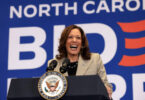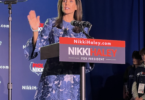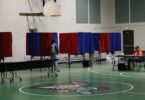By Akua Devall
Boston University News Service
Violence in Israel and Gaza has caused an intense divide between students on college campuses. They’ve become a hot spot for conversations surrounding freedom of speech and its suppression.
The idea that colleges and universities are the bedding ground for diverse voices and opinions has come into question following the sharp pushback and even death threats students around Massachusetts have been receiving for voicing their beliefs on the ongoing Israel-Hamas conflict.
On the weekend of Oct.11, a “doxxing truck,” organized by conservative media group Accuracy in Media. Doxxing is when someone publishes private, personal information with malicious intent.
The truck paraded around Harvard University’s campus, digitally flashing photos and names of the students who co-signed a letter that blamed Israel for Hamas’ surprise attack. Above the photos was a banner that read “Harvard’s Leading Antisemites.”
Harvard Palestine Solidarity Committee, a coalition of student organizations, posted an open letter on social media on Oct.7 saying that they “hold the Israeli regime entirely responsible for all unfolding violence.” The statement was released the same night as the Hamas attacks that killed at least 1,400 Israelis and took over 100 hostages near the Gaza Strip.
Even after the truck finished patrolling, the doxxing attacks continued to spread. Four websites published the names, faces, and contact information of signees.
At least nine of the original 34 student groups who signed the letter withdrew their signatures as doxxing threats grew.
The backlash to PSC’s statement was almost immediate. It prompted outcries from Harvard students, alumni, and U.S. business leaders about the anti-Israel sentiments.
In a statement to ABC News, Jacob Miller, the president of Harvard Hillel, said he was “appalled” by the letter’s statement. “The last thing to do, the absolute last thing to do, is to blame the victim, and that’s exactly what that letter did,” he said.
Billionaire Bill Ackman, a hedge fund manager and Harvard alum, pressured Harvard to go as far as releasing the names of students a part of organizations that co-signed the pro-Palestine letter.
“I have been asked by a number of CEOs if Harvard would release a list of the members of each of the Harvard organizations that have issued the letter assigning sole responsibility for Hamas’ heinous acts to Israel,” he said on the social media platform X. “One should not be able to hide behind a corporate shield when issuing statements supporting the actions of terrorists.”
The university has not released the names of any signees.
An anonymous Harvard Law Student said that they know of many students who had “no say” on the decision that their student group made to sign the letter.
“Many weren’t even notified that their [organizations] were considering doing so,” they said on X. “[There is] no need for this level of harassment.”
Claudine Gay, the president of Harvard, released a statement on Oct. 10 condemning Hamas attacks, but she refused to outwardly criticize the students behind the anti-Israel letter.
“Let me also state, on this matter as on others, that while our students have the right to speak for themselves, no student group — not even 30 student groups — speaks for Harvard University or its leadership,” she said.
Tufts University faced a similar conflict on Oct. 10 after the Anti-Defamation League of New England released a screenshot of an email sent out by Tufts Students for Justice in Palestine. The letter said that the attack against Israelis exhibited “the creativity necessary to take back stolen land.”
Unlike Harvard, Tufts faculty quickly condemned the email released by Tufts SJP, saying they were “strongly” against the group’s statements.
“We strongly disagree with and denounce SJP’s statement and want to make clear that no student group speaks for the university,” wrote Patrick Collins, the spokesperson for Tufts, in a statement to “The National Desk.”
Rabbi Naftali Brawer of Tufts Hillel, also denounced the message from SJP, stating that nothing can justify the violence committed by Hamas.
“The idea that a group of students would not only justify but glorify such stomach-turning, heinous acts is morally reprehensible and deeply concerning,” Brawer wrote on Tufts Hillel’s Facebook Page.
Tufts SJP held a vigil the same day that they released their letter to mourn the Palestinian lives lost from the violence in Gaza. Harvard’s PSC was supposed to have a vigil the next day but was postponed to Oct.13 “due to credible safety concerns and threats against student security,” according to a post on the PSC’s Instagram.
Boston University religious organization Hillel and BU Students for Israel hosted a candlelight vigil On Oct.11 to stand in solidarity with Israel and mourn the lives lost from Hamas’s initial attack on Israel.
Hundreds of students came out to the gathering, which began with a group prayer. Speakers included members of different Jewish-centered organizations at the university.
“We are here today to remember and mourn the beautiful souls lost during the darkest time in Israel’s modern history,” said Yonatan Manor, president of BU Students for Israel.
A week later, BU Students for Justice in Palestine hosted a pro-Palestine vigil at BU Beach after a strike on a hospital in Gaza killed hundreds of Palestinians, according to the Gaza Health Ministry.
Speakers revealed that they’ve received death threats and been doxxed for their association with SJP.
“This vigil was created as a space to grieve the lives lost at the hands of the Israeli apartheid state,” wrote SJP in an Instagram post. “Following the events since Oct. 7th, it has been insanely difficult for all of us who are advocating for Palestine liberation, especially for those who have family in Palestine or those who are more vulnerable to anti-Palestine, racist, and Islamophobic harassment.”
BU SJP followed up the vigil by creating a petition titled “Demanding that Boston University Takes Action Now!” The petition aims to convince Boston University’s administration to show more allyship to Palestine.
The anonymous Harvard Law Student’s name was originally reported in the article, but has since been removed due to safety concerns their family has been facing.




